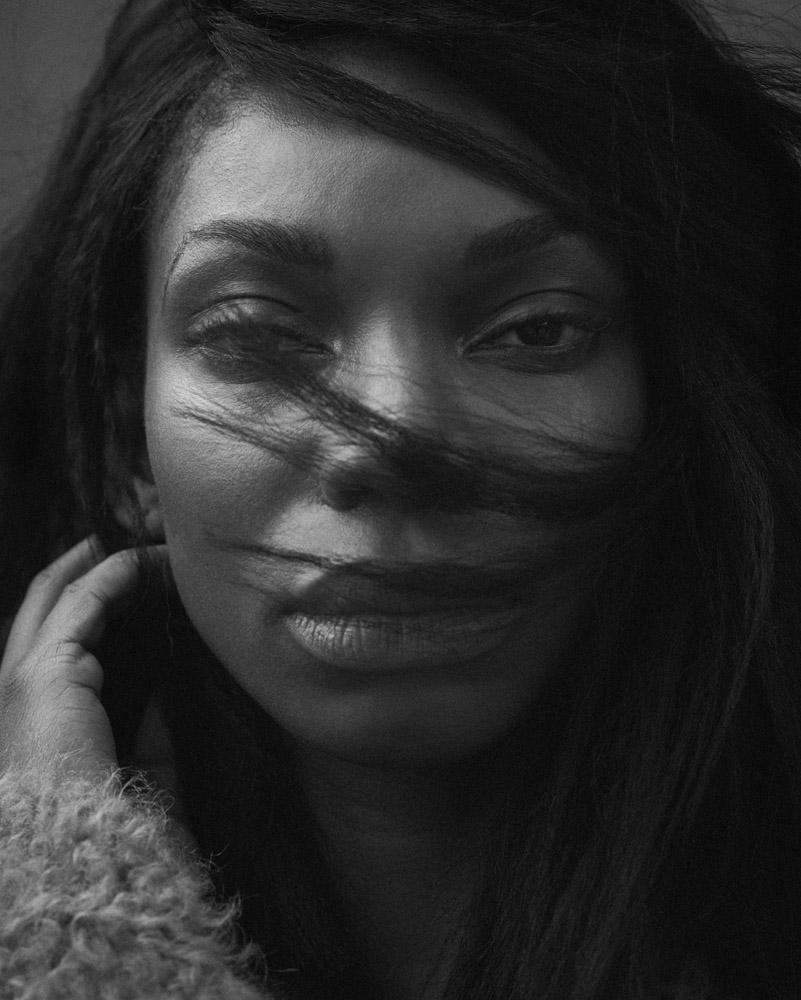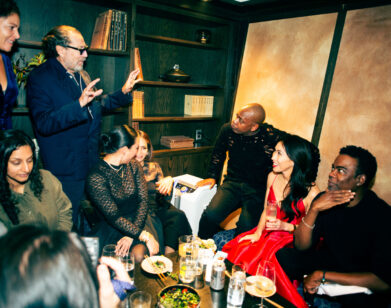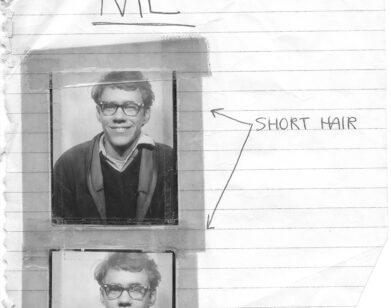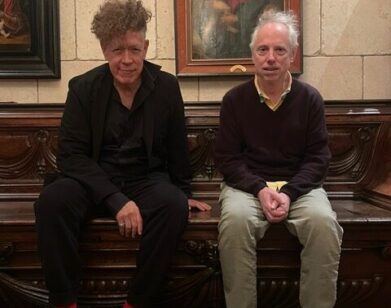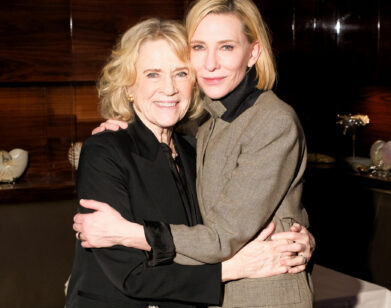The Showrunner
MICHAELA COEL IN LONDON, NOVEMBER 2016. PHOTOS: JASON HETHERINGTON/SERLIN ASSOCIATES. STYLING: TANJA MARTIN. HAIR: KEVIN FORTUNE USING PHILIP KINGSLEY. MAKEUP: VICTORIA BOND/CAREN AGENCY USING BURBERRY BEAUTY.
When we talk to Michaela Coel over the phone, she is in the final stages of editing the second season of her television comedy Chewing Gum. Currently available in the US via Netflix, the show follows Tracey, a sheltered young woman living on a London council estate with her mother and fervently religious sister. Played by Coel herself, who also created, writes, and produces the show, Tracey is in a form of suspended adolescence—ready to move on with her life, but unsure of how to begin. It’s a project that has already won Coel two BAFTA Awards: one for Best Female Performance in a Comedy and one for Breakthrough Talent. “Whatever the hell is going on right now—this whole TV thing,” she explains, “wasn’t in my plan.”
Still only 29, Coel was raised in London by Ghanian parents and trained as an actor at the Guildhall School of Music and Drama. She began her career onstage, first in her own play, Chewing Gum Dreams—the basis for her current television show—and then as an actor in productions at the National Theatre. She’s had supporting roles on critically acclaimed television shows like Top Boy, London Spy, and, most recently, the new season of Black Mirror (see: “Nosedive,” the episode co-written by Rashida Jones, directed by Joe Wright, and starring Bryce Dallas Howard). Chewing Gum is without a doubt, however, her biggest project to date. “I was always an actor,” she tells us. “I guess the new thing now is being asked to write shows.”
EMMA BROWN: I know you originally wrote Chewing Gum as a play while you were at drama school. What made you want to adapt it into a television series and make it more of a straight comedy?
MICHAELA COEL: Originally, I just extended the play. It was 15 minutes and I wanted it longer, so I did an hour version. Then my writing agent sent it out to a bunch of production companies. I didn’t actually know that she had done that. I wasn’t really thinking about doing television at all, but a lady from Retort, the production company that makes Chewing Gum, read the play and thought I could develop a TV show. The play’s actually quite dark, but because Retort is a comedy production company, I had to make it a comedy, which I think worked out best. I’ve always liked using humor, but what I had to with Chewing Gum was take out a lot of darkness so it would be a bit more feel-good. A way of compromising that was to make it quite uncomfortable; Tracey finds herself in quite embarrassing situations.
BROWN: Why was making it uncomfortable important to you?
COEL: I think I like plucking on whatever string it is inside of people—the thing that makes you go, “Oof, my God.” I like that feeling. It’s a bit like saying, “Why go on rollercoaster rides?” Why do we actually do that? I like activating that feeling in people and myself.
BROWN: You’ve said in the past that you don’t know if Tracey is exactly like you or the complete opposite. When you’re writing Chewing Gum, is it easy to get Tracey in and out of your head?
COEL: I think it’s easy because I’m writing and being a lot of people—I’m being every character in the show, which I think, this year, is 52 in total. You become good at compartmentalizing each person. When I’m writing for Aaron, I am Aaron, and for the very next line, I can easily become someone else.
BROWN: I know you had a very formative English teacher when you were a teenager, but what made you decide to go to drama school?
COEL: I became a very passionate Christian when I was 17. I started writing and performing poetry at different venues across the UK. I started performing from then, really. A writer-director was in the audience at one of my shows, and he was like, “You should think about doing some acting.” And because I didn’t really know what I was doing—I had no firm decision or desire to do anything in my future—it meant I was going wherever the wind blew, so I just listened to the guy and I went and got some weekly drama school lessons. Then he told me to apply to drama school and I did, even though it wasn’t in my plan, basically.
BROWN: Did you grow up in a religious household?
COEL: Definitely a household that believed in God, but not a religious household. My mum didn’t attend church when I was young. I went to a Catholic school, and she sent us to Catholic church, so there was always a God thing going on, but nowhere near as religious as I became when I was 17.
BROWN: But you didn’t become Catholic?
COEL: No, I became a Pentecostal evangelical—all-shouting, all-singing, all-dancing, all-demon-exercising Christian.
BROWN: Are you still religious?
COEL: No. I definitely believe in spirituality. I like to pray, but I’m not praying to something that I can define; I’m just speaking because I know it does have an effect. I believe there are some great things that I’ve taken from the Bible in terms of loving the world and trying to be kind. There are a lot of good things to take from the Bible, and I like to think I try to apply them to my life.
BROWN: If it was such a big part of your life, do you miss it ever?
COEL: Yes, massively. I think that time in my life was very happy. Looking back, the way I see it, there was something slightly deluded about my belief—what that meant to me—but with that delusion came of lot of happiness. Life was really black and white: if you do these things now, God will you invite you to his house where you will love forever and everything will be happy forever. That’s what I believed, and that makes life pretty sweet. I do miss it. There’s a massive community in church. You have a real home. You can move to different parts of the world and you’ll always find a church and a community. When you let go of church, you don’t have that comfort, you don’t have that safety net anymore.
BROWN: When you left drama school, did you want to do both writing and acting?
COEL: I definitely wanted to do writing and acting. From the very beginning as a poet, I was writing my poems and I was performing my poems myself. I would occasionally write for other people, but it was mainly, “I’m writing the story and now I’m going to tell it to everyone.”
BROWN: You’ve done jobs where you’re just an actor—what’s that been like?
COEL: Fun. With my show, I act in it, I write it, and I produce it, and it’s sometimes fun, but your brain is working at a level that is very tiring. You can’t sleep because you’re thinking about the show all the time. When I’m just acting, I get to find out about this character—how this person relates to all these people, who is she, my place in this project. It’s nice to not have the pressure of knowing, “We have this many hours to shoot here,” or, “We’re going to have to spend another however many of thousands of pounds tomorrow,” or, “We don’t have time in schedule.” All that stuff is out the window and it’s great.
BROWN: You’re in an episode of Black Mirror, which is obviously such a big show now. Did you just get a call saying, “Do you want to do this?”
COEL: No, it doesn’t work like that. [laughs] I went in and auditioned for Joe Wright, the director [of that episode], and then I got the part. I’m still very much like all the other actors in that if I like the script, I’ll go in and read for it. And I loved the scene and I loved the character. It is the funnest part I’ve ever played. I know it’s only one scene, but I got so much pleasure from doing it. Bryce Dallas Howard is magical to work with. It was so easy and so fun. We shot that scene countless times, and we’d already got the shot, but it was just so fun, [Joe] just wanted to keep doing it. [laughs]
BROWN: What was your first professional acting role?
COEL: I did my play, Chewing Gum Dreams. After, I got a play called Three Birds about three siblings living in a single-parent household whose mum dies. They try and freeze her body to bring it back to life, so they keep it in the bath. It was a very, very dark comedy about leaving the one parent you had and not being able to take care of yourself at all—no family to lean on. With that show, I was so full of anxiety and self-obsession—constantly worried about my performance and how I would come across—that I didn’t really get to give myself to the play the way I would have now. Since then, I’ve done other [plays]; I did Medea two years ago with Helen McCrory—very dark. [laughs]
BROWN: When you’re doing such dark material, do you carry it with you?
COEL: When it’s almost too relevant to what’s going on now, it can be very, very hard, but normally, the minute I don’t have to cry anymore in a scene, I can definitely just stop crying and find something to laugh about.
BROWN: Are you someone who always carries around a notebook to write down ideas?
COEL: Absolutely not. No. I can just sit in a room by myself and literally do nothing and not think of anything. I don’t carry around a notebook—I wish I did. I occasionally will record a voice memo, or quickly write down something in my phone, but I don’t think I’ve ever revisited a single thing I’ve ever written. [For] writing, I always travel. I can’t write in London. I’ve been to Lake Tahoe—that’s where I wrote the first draft of the first season of Chewing Gum. This year I went to Berlin; I went to Cornwall. I went to Zurich in Switzerland. I write very quickly; I set myself two and a half weeks to write six episodes. You will not find me doing any jotting down of anything. I don’t like working—I just like having done the end product. [laughs] The process, I like to make it quick and painful, I’d say.
BROWN: How far do you see Chewing Gum going? Do you have an end point in mind or are you taking it season by season?
COEL: Definitely taking it season by season. I’m full of so many ideas, but I’m also quite itchy to create something new. Really, I want to do everything next. I can never quite decide—whichever contract gets finished first, because they’re so many brilliant opportunities now. I know whatever it is, I want it to be something I’m proud of.
SEASON ONE OF CHEWING GUM IS CURRENTLY AVAILABLE VIA NETFLIX.
For more from our “Faces of 2017” portfolio, click here.

